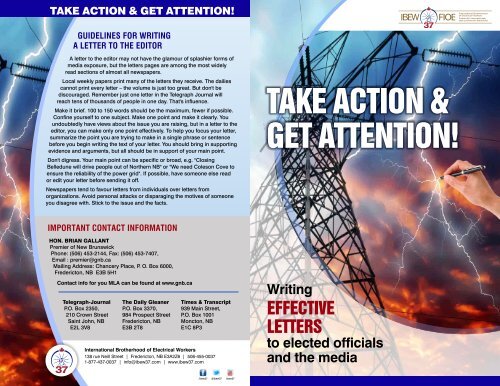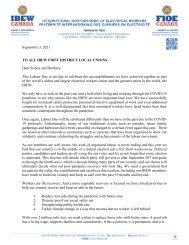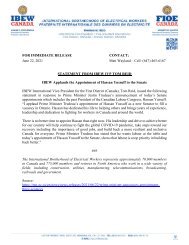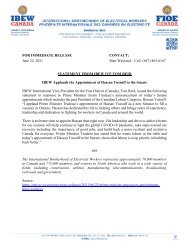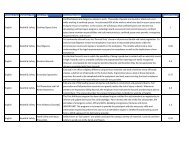Letter Writing Guide
Create successful ePaper yourself
Turn your PDF publications into a flip-book with our unique Google optimized e-Paper software.
TAKE ACTION & GET ATTENTION!<br />
GUIDELINES FOR WRITING<br />
A LETTER TO THE EDITOR<br />
A letter to the editor may not have the glamour of splashier forms of<br />
media exposure, but the letters pages are among the most widely<br />
read sections of almost all newspapers.<br />
Local weekly papers print many of the letters they receive. The dailies<br />
cannot print every letter – the volume is just too great. But don't be<br />
discouraged. Remember just one letter in the Telegraph Journal will<br />
reach tens of thousands of people in one day. That's influence.<br />
Make it brief. 100 to 150 words should be the maximum, fewer if possible.<br />
Confine yourself to one subject. Make one point and make it clearly. You<br />
undoubtedly have views about the issue you are raising, but in a letter to the<br />
editor, you can make only one point effectively. To help you focus your letter,<br />
summarize the point you are trying to make in a single phrase or sentence<br />
before you begin writing the text of your letter. You should bring in supporting<br />
evidence and arguments, but all should be in support of your main point.<br />
Don't digress. Your main point can be specific or broad, e.g. "Closing<br />
Belledune will drive people out of Northern NB" or "We need Coleson Cove to<br />
ensure the reliability of the power grid". If possible, have someone else read<br />
or edit your letter before sending it off.<br />
Newspapers tend to favour letters from individuals over letters from<br />
organizations. Avoid personal attacks or disparaging the motives of someone<br />
you disagree with. Stick to the issue and the facts.<br />
TAKE ACTION &<br />
GET ATTENTION!<br />
IMPORTANT CONTACT INFORMATION<br />
HON. BRIAN GALLANT<br />
Premier of New Brunswick<br />
Phone: (506) 453-2144, Fax: (506) 453-7407,<br />
Email : premier@gnb.ca<br />
Mailing Address: Chancery Place, P. O. Box 6000,<br />
Fredericton, NB E3B 5H1<br />
Contact info for you MLA can be found at www.gnb.ca<br />
Telegraph-Journal<br />
P.O. Box 2350,<br />
210 Crown Street<br />
Saint John, NB<br />
E2L 3V8<br />
The Daily Gleaner<br />
P.O. Box 3370,<br />
984 Prospect Street<br />
Fredericton, NB<br />
E3B 2T8<br />
Times & Transcript<br />
939 Main Street,<br />
P.O. Box 1001<br />
Moncton, NB<br />
E1C 8P3<br />
International Brotherhood of Electrical Workers<br />
138 rue Neill Street | Fredericton, NB E3A2Z6 | 506-455-0037<br />
1-877-437-0037 | info@ibew37.com | www.ibew37.com<br />
<strong>Writing</strong><br />
EFFECTIVE<br />
LETTERS<br />
to elected officials<br />
and the media<br />
/ibew37 @ibew37 /ibew37
TAKE ACTION &<br />
GET ATTENTION!<br />
DON'T UNDERESTIMATE THE POWER<br />
OF A PERSONAL LETTER<br />
Campaigns can be won when dozens or hundreds of people telephone,<br />
write letters, and send e-mails to elected officials and the media.<br />
Petitions and postcards are easier, but politicians recognize this – so you<br />
need thousands of names on a petition, or thousands of postcards to make<br />
an impact. A well-placed and well-written personal letter can be very effective.<br />
WRITING EFFECTIVE LETTERS TO POLITICIANS<br />
One of the biggest hurdles in effective letter writing is the fear that you have<br />
to be an expert to discuss an issue. Usually, the politician will likely know less<br />
about the issue than you do. <strong>Letter</strong>s are used to measure constituents' feelings<br />
and can serve as a basis for action. The successful letter applies the three R's:<br />
be RIGHT, REASONABLE, and REPETITIVE.<br />
Rule 1: State your position clearly and identify a specific request. The most<br />
common weakness in letters is being unclear about what you want.<br />
Rule 2: Ask specific, leading questions that require a response. The strategy<br />
is not just to let them know your opinion, but to make them work on your<br />
behalf, and keep working until they resolve the issue.<br />
Rule 3: Make it clear you expect an answer.<br />
Rule 4: Send copies to other politicians. Copies or individually addressed<br />
letters will expand your effectiveness with little extra work. After all, you wrote<br />
the letter, so spread your impact far and wide.<br />
Rule 5: Keep a copy.<br />
WHAT SHOULD YOU EXPECT FOR AN ANSWER?<br />
Response 1: Zero. The politician has ignored your questions and said<br />
absolutely nothing.<br />
Response 2: Affirmative, agreeing with your stance. Seldom will you<br />
hear this. This is more likely the answer from the opposition members<br />
or a supportive backbencher. If they're genuinely on your side, they'll<br />
appreciate the moral support.<br />
Response 3: Newspeak. This is the “current” truth or policy,<br />
which is a selection of the facts in support of their position. The<br />
answer may also take the tactic of trying to overwhelm you with<br />
technical details.<br />
NOW, YOU'VE RECEIVED YOUR RESPONSE. WHAT NEXT?<br />
Go back to your first letter and begin a second one. It is this follow-up letter that will be<br />
enough to make them take you seriously. This time they'll know they can't just brush you<br />
off as they may have attempted in the first letter.<br />
Tactic 1: Ask again any questions the politician didn't answer or didn't answer fully.<br />
Tactic 2: Point out any inconsistencies between their response and others you have<br />
received, or with their government's public statements.<br />
Tactic 3: Point out any weakness in their arguments.<br />
Tactic 4: Restate your position and make it clear that you expect a response.<br />
LETTER-WRITING IS LIKE A SLOW GAME OF PING PONG.<br />
IT'S THE SECOND AND THIRD LETTERS THAT START SCORING.<br />
Sending letters to the Opposition Leaders and critics can often be useful. Sometimes<br />
they'll warm up and go after the Ministers in the Legislature. Sending to Ministers not<br />
directly responsible for the issue you are concerned about is a sign to the Government<br />
that everyone is being drawn in and they must take a stand.<br />
In addition to the Premier and Minister responsible, don't forget to write to your own MLA<br />
(contact info at www.gnb.ca). A phone call or two on any issue tells them they've got an<br />
issue they must deal with. Fifteen letters and they'll know they've got a hot issue getting<br />
out of control.<br />
You'll likely get a personal reply and it could<br />
sound very informed. Once you've got your<br />
MLA on the run, keep him or her there.<br />
The more letters, phone calls, and faxes a<br />
politician receives, the more seriously they<br />
will take them. Above all, encourage<br />
citizens outside your group to write letters<br />
of their own.<br />
Remember, the pen is still<br />
mightier than the sword.<br />
Have fun.<br />
Adapted from Connexions Online Digest: “The Write Stuff”


